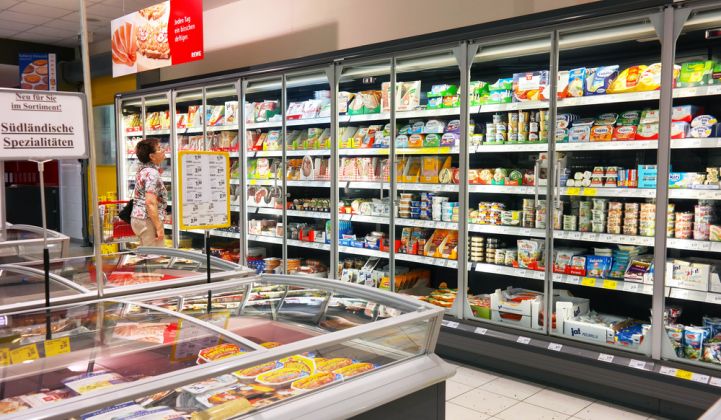New money is flowing to small thermal storage startup Axiom Exergy.
The company closed a $7.6 million Series A to scale its cold-storage device for grocery stores, bringing its total funds raised to $12.5 million. Shell Ventures and GXP Investments led the round, which also included WorldQuant Ventures, SV Tech Ventures and Meson Capital.
The 15-person startup will use the funds to grow its grocery partnerships from initial installations with Whole Foods and Walmart. The company also plans to expand its cloud-based data analytics to optimize how its product shifts stores' electricity consumption.
“Where we really deliver a lot of value is when we take that flexibility and operate it in a really intelligent way,” said Axiom Exergy CEO and co-founder Amrit Robbins. “We have a deep understanding of the refrigeration assets and the thermal systems in these cold-chain facilities like grocery stores.”
The investment places a bet on the small and often overlooked thermal storage industry.
Most energy storage startups these days use batteries to store electricity electrochemically, but a handful of entrepreneurs sell devices to store energy in hot or cold insulated vessels. These can save money for customers by delivering that stored heating or cooling when electricity prices peak; they typically employ off-the-shelf components that entail minimal technology risk.
Now that an oil and gas supermajor and a handful of venture capital firms have put some money in the ring, others may follow. Shell this week also announced an investment in GI Energy, a distributed energy specialist based in Chicago.
Within the thermal storage sector, Axiom Exergy zeroed in on the niche of refrigeration for grocery stores. Keeping food sufficiently cold sucks up a lot of money every month, and if the power goes out, stores can lose hundreds of thousands of dollars' worth of food to spoilage in the course of just one day.
Axiom’s device slips onto the existing central cooling unit and time-shifts cooling so that the store uses less electricity during moments of peak demand or peak power pricing. The product can also provide six to eight hours of backup cooling in case of an outage.
The load-shifting ability opens up a third value stream, aggregated grid services like demand response. Axiom offers its equipment as a subscription service, so customers needn't worry about upfront capital costs.
First, though, the company needs to scale.
One Refrigeration Battery unit is up and running at a Whole Foods in Los Altos, California, and another will begin operations this month at a Walmart Neighborhood Market in Escondido.
The plan is to convert pilots into master service agreements with customers’ corporate leadership, which would let Axiom easily sell across entire grocery store fleets, rather than making a series of one-off deals. The company has turned its pilot product into a model that can be produced in large numbers by a contract manufacturer, Robbins said.
Robbins hopes to offer multi-site rollouts this year. The densely concentrated nature of the grocery store industry could allow this to happen expeditiously: The leading chains control hundreds or thousands of stores across the country.
“Decision-making is incredibly centralized,” Robbins said. “We’re almost exclusively selling at the corporate level.”
That’s a promising growth path, made even more tantalizing because nobody else is competing for it.
The small thermal storage industry has shaken out into various niches: Calmac (recently acquired by HVAC provider Trane) does it for major commercial properties, Ice Energy does it for home and business air-conditioning, and Viking Cold Solutions serves the low-temperature or frozen supply chain.
The thesis motivating Axiom, then, is that once customers understand the value that the Refrigeration Battery provides, adoption will pick up sharply.
“Assuming that we are able to execute and deliver the value to our customers that we’ve promised them, sales are not going to really be an issue,” Robbins said. “At that point, it’s going to be our ability to scale as an organization and deliver these products fast enough.”
The ability of a young startup to scale sustainably should not be assumed or taken for granted, however. Along the way, the company will have to allocate its limited resources to the right balance of deploying the existing product versus developing the next generation or expanding to serve different markets.
A more enduring challenge may be achieving elusive success with a type of technology that has failed to gain widespread traction in the decades it has been available.
I explored the reasons for this in previous reporting. Thermal storage lacks the unique appeal that Elon Musk has gifted to lithium-ion. It requires an often-grueling sales cycle to convince building energy managers to attach a new gadget onto their cooling system or to replace an existing system altogether.
Undifferentiated electricity rates have long thwarted the economics of time-shifting one’s cooling load. Why bother if electricity costs the same to the user at any time of day?
But that’s finally starting to change. Time-differentiated rates for commercial customers have proliferated, and that poses a significant risk for grocery stores, which have stable, inflexible demand. The milk has to stay cold whether or not a demand charge is in effect.
Corporate attitudes toward energy and sustainability have also changed. Walmart has invested heavily in renewable energy and distributed storage. Whole Foods’ owner Amazon has a sophisticated energy team that plays an active role in the grid’s transition to cleaner energy.
Now, when startups come around pitching flexibility for grocery store energy consumption, these corporates have reason to hear them out — and the expertise to understand what they’re saying.
“At this point, we have the right team to do what we need to do,” Axiom's Robbins said. “We have the resources. We have a really strong network of investors and partners, and we have...A-list customers.”
If the product works as well as it's supposed to, look out for more of those A-listers to be signing up in the coming months.




